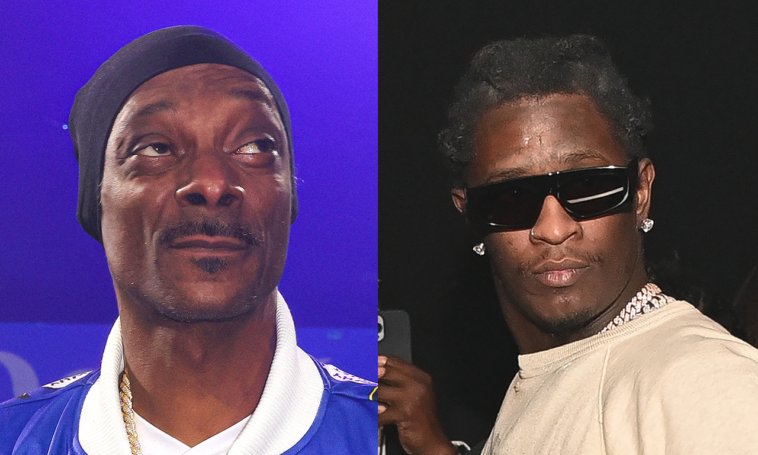The defense took a unique tactic in Young Thug’s trial for breaking Georgia’s RICO Act and other gang-related charges. Young Thug’s attorney, Brian Steel, used a Snoop Dogg video to distinguish rap and gang culture during Trontavious “Tick” Stephens’ cross-examination.
The prosecution’s use of Young Thug’s rap lyrics to claim he was a YSL gang member has drawn criticism for introducing racial bias into the trial. The defense used Snoop Dogg’s Super Bowl performance to contest this association by showing his crip walk dance, typically associated with Crips gang culture.
“This case shows the difficulty of interpreting rap lyrics as evidence and the need to comprehend these artists’ cultural milieu.” – Lawyer.
Legal teams are trying to prove that metaphorical and artistic rap lyrics are not confessions or evidence of criminal activity. Before, videos of Serena Williams dancing the crip walk were shown to illustrate the dance’s cultural context.
In court, YSL co-founder Trontavious Stephens testified for the prosecution. Young Thug’s lawyer tried to show under cross-examination that rap culture has gang features but doesn’t necessarily mean gang membership. The defense used Snoop Dogg’s performance to demonstrate how culture and rap are linked.
Stephens also proposed that Young Thug’s moniker meant ‘Truly Humble Under God.’ The defense contested this theory by interrogating the witness about specific Thug song lines, exposing the intricacies of lyrics interpretation.
The defense’s use of Snoop Dogg’s performance is part of a discussion over rap lyrics in criminal prosecutions. Critics say using songs as evidence perpetuates racial bias and misinterprets the genre’s art. In the UK, the Art Not Evidence campaign wants to prohibit rap lyrics in court to redress historical injustices against young Black men.
Young Thug’s defense team is arguing that artistic expression is not criminal intent as the trial progresses. As the case unfolds, it raises crucial questions about music, culture, and criminal justice.
The defense’s use of Snoop Dogg’s Super Bowl performance highlights the legal misreading of rap culture. Young Thug’s attorney, Brian Steel, maintained that the crip walk, a gang dance, is embraced in hip-hop culture and not unique to gang members.
This approach fits with criticism of the prosecution’s use of Young Thug’s songs as evidence. The idea is that these lyrics are symbolic, reflecting the artist’s experiences and society rather than clear criminal admissions.
The defense’s focus on the crip walk’s cultural importance is part of its opposition to using rap lyrics to prove criminal intent. The judicial system has historically misinterpreted rap artistry, criminalizing musicians based on their lyrics.
Trontavious “Tick” Stephens’ recognition of Young Thug’s name as ‘Truly Humble Under God’ enhances the defense’s case. The defense argues that Young Thug is a spiritual and humble artist, disputing the prosecution’s claim that his stage name indicates criminal ties.
The defense is dismantling the prosecution’s narrative throughout the trial. The defense uses cultural allusions like the crip walk and other interpretations of Young Thug’s name to show that his art is not criminal.
This case highlights social debates concerning Black art form stereotype and misinterpretation, notably in the legal system. Rap culture is multifaceted, and the defense’s strategy is to distinguish artistic expression from criminal action.
Young Thug’s trial may affect future legal cases involving hip-hop artists’ art. Rap lyrics as evidence are challenged by the defense, prompting a critical study of music, culture, and the criminal justice system.




Join the Community and Be a Part of the Conversation
You must be logged in or registered to post a comment.